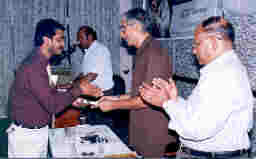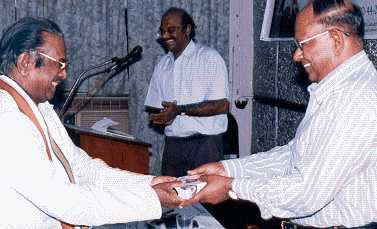 |
| Trinity Mirror 15 June 2002 |
Sunday, 16 June 2002
Economic and Expenditure Reforms - discussion
An interaction session with Mr K P Geethakrishnan, former Union Finance Secretary and Chairman of Expenditure Reforms Commission (ERC) set up by the Government of India was held on Friday the 14th June, 2002 at Hotel Palmgrove. The topic of discussion was "Economic and expenditure reforms - what, why and how?'
K. Srinivasan (Founder of the Foundation), Mr K P Geethakrishnan, Mr T S Raghavan (former Chairman of Indian Bank) - Mr T S Raghavan moderated the programme
Eminent personalities of Madras City participated in the programme and shared their views. A section of the audience
Mr S Subramanian of AMP Sanmar Assurance Company Limited (sponsors of this event) presenting memento to Mr K P Geethakrishnan. Mr T S Raghavan looks on
The programme was attended by various cross section of the people representing different sectors. Mr K Rangarajan, one of the senior Trade Union leaders presenting his views.
Dr U Srinivasa Raghavan, Chief Post Master General of Tamilnadu and Dr A Kalanidhi, former Vice Chancellor of Anna University presenting their views
Senior political leaders also participated in the programme. Dr Kirubanidhi, President of Bharatiya Janatha Party Tamilnadu and one of the senior political leaders presenting the memento to Mr T S Raghavan.
The report of 'The Hindu' (India's leading National Newspaper) dated 15th June 2002 is given below:
Expenditure Reforms: Better off urged to make sacrifices
Govt. must concentrate on priority areas
Chennai June 14 : The rationale behind the report of Expenditure Reforms Commission is not that certain job cannot be done by the Government but that they could be left to the private sector, so that government resources could be concentrated on priority tasks, according to the Commission Chairman, K P Geethakrishnan.
Participating in a meeting organised by the Prime Point Foundation here today, Mr Geethakrishnan said the main task was to improve the quality of life of the people, especially those linked to the vast land-based rural economy, by expanding outlays on primary education, primary health care and other social services.
"There will be no reduction in the total expenditure of the Government" if the recommendations of the commission are implemented, but the priorities in outlays and subsidies would be different compared to the decades before economic reform was initiated in practice from 1985 Mr Geethakrishnan said.
Citing the objective of improvement of the human development index through a higher rate of economic growth as the primary rationale behind economic reform, he said the second major rationale was the need to earn enough foreign exchange by exporting competitive and quality products to finance vital imports of petroleum and fertilisers. He called for 'sacrifices' from the 'better off' and organised sections of the populace in terms of reduction in subsidies and higher tax compliance.
Mr Geethakrishnan said only a small part of the reform agenda had been implemented so far and positive results of reform could be in evidence only after full scale implementation "covering 196 more aspects", including in respect of areas such as agriculture, land market, labour laws and interest rates.
If the reform process had not been initiated in time, India would have faced the type of total collapse that post-Soviet Russia and Indonesia witnessed, he said.
T S Raghavan, former Chairman of Indian Bank said more than the issue of recovery of non performing assets (NPAs) of banks, what should cause concern was the increasing reluctance on the part of banks to lend for fear of being penalised for commercial decisions which might go wrong for reasons beyond their control.
Most participants from the floor representing trade unions, small industry and academia opposed reforms on the ground that these were leading to closure of domestic industries and high levels of unemployment especially among the youth.


























